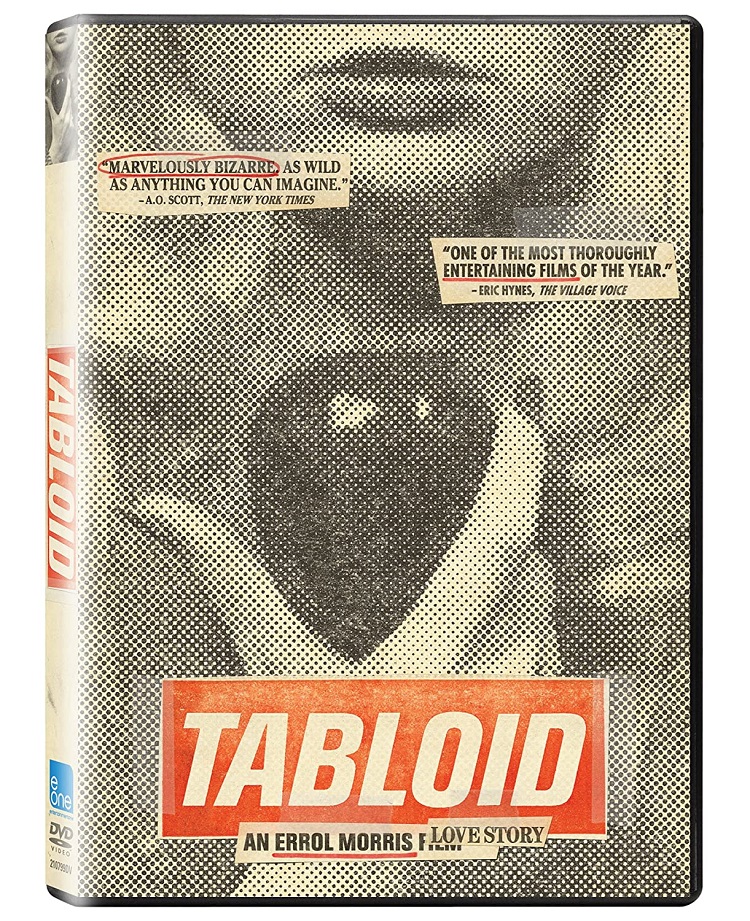
Written by Kristen Lopez
Director Errol Morris has interviewed serious subjects like Robert S. MacNamara and delved deep into harsh topics like the justice system and the history of time itself. So it can only look like he’s run out of ideas with the frothy, utterly ridiculous documentary, Tabloid. And you’d be wrong in that summation because Tabloid takes a crazy story, told by someone who seems to define the world, and opens it up into an examination of gender, the media culture, and the power of religion. At time’s hilarious and ridiculous, Tabloid sounds like a fun documentary, but indicates that we haven’t come very far since.
Joyce McKinney was a Southern belle/beauty queen who fell in love with a man named Kirk Anderson. Anderson was a Mormon whom, according to McKinney truly loved her but was being controlled by the Mormon church. A strange sequence of events, leading to a he said/she said court case labeled Kirk “the Manacled Mormon” and Joyce the foul temptress trying to sway the sheep from his flock.
Obviously, there are two sides to every story, and Morris works with as many people as he can. McKinney’s voice drives the narrative, as she gives her version of events; that of a wayward love story between two people destined to be together, only to find themselves torn apart by a wicked “cult” (McKinney’s words) who hated her because she saw through them. On the surface, this sounds ridiculous, and the holes are punched wider as Morris takes the time to interview a former Mormon who explains that Kirk’s “disappearence” was really him participating in his mission, a typical Mormon practice, and how the guilt of him breaking his vows of chastity would have driven him to do whatever was necessary to be reaccepted by his church.
Morris gives us a wealth of different voices, so we aren’t left with just McKinney’s version of events. The humor derives from how different the two stories are. Nothing is seen the same by two different people. Even McKinney’s description of Anderson as a good-looking man is contradicted by reporters who describe him as a chubby, average looking guy, far from the Adonis that would inspire all this fervor. None of this, sadly, takes away from the biggest voice Morris misses: Kirk Anderson’s. For reasons that seem apparent, Anderson doesn’t speak to the camera, but it’s odd that court testimony or other interviews with him aren’t included, particularly considering they’re public record.
Anderson’s lack of voice might be because this isn’t truly his story. Tabloid is The Joyce McKinney Show and it’s hard not to get wrapped up in her charming, genteel affability. Her story of a forbidden romance has all the makings of a William Shakespeare play written by a 12-year-old girl, and she never falters regarding any of the mistakes that happened. Either she has no remorse or she truly didn’t understand what she was doing. Then again, there are moments where McKinney flat-out refuses to accept responsibility for things that have clear-cut facts, in this case nude pictures that were printed in a British tabloid and which were proven to be known by her.
All of this leads to Morris’ bigger expose, that of how the media reports sex and sexual crimes based on gender. Sneaking in underneath all the salacious tales of a “manacled Mormon” is the question of male rape, something McKinney refuses to believe exists – and she’s not alone in those beliefs. The tabloid culture, their headlines filling the screen, embrace the salacious sex story that a phrase like “manacled Mormon” conjures up. Images of McKinney as Eve, holding the apple, gives off the impression she’s a calculating whore desperate to corrupt the innocence of any young man who crosses her path. Looking at McKinney now, the image seems incorrect, and for all we know, McKinney is telling the truth about her virginity and deeply abiding love for Kirk. However, the bigger point is, even if she was all those things, that’s her business. Morris, without saying anything, shows how sex and the single girl is still demonized in today’s tabloid culture; how it’s still something to sneer at and whisper at.
After the “manacled Mormon” fever dies down the third act becomes a bit less interesting. We follow McKinney as she becomes a garish quasi-celebrity, eventually retiring to a small ranch and becoming agoraphobic. After decades of silence, McKinney eventually came screaming back into the headlines as being the owner the first cloned dog, a story that’s just as insane (albeit more authentic) than the Anderson story.
Tabloid isn’t Errol Morris’ most hard-hitting piece, but it’s infinitely fascinating and compelling, telling a story which blossoms into a condemnation of the media culture.